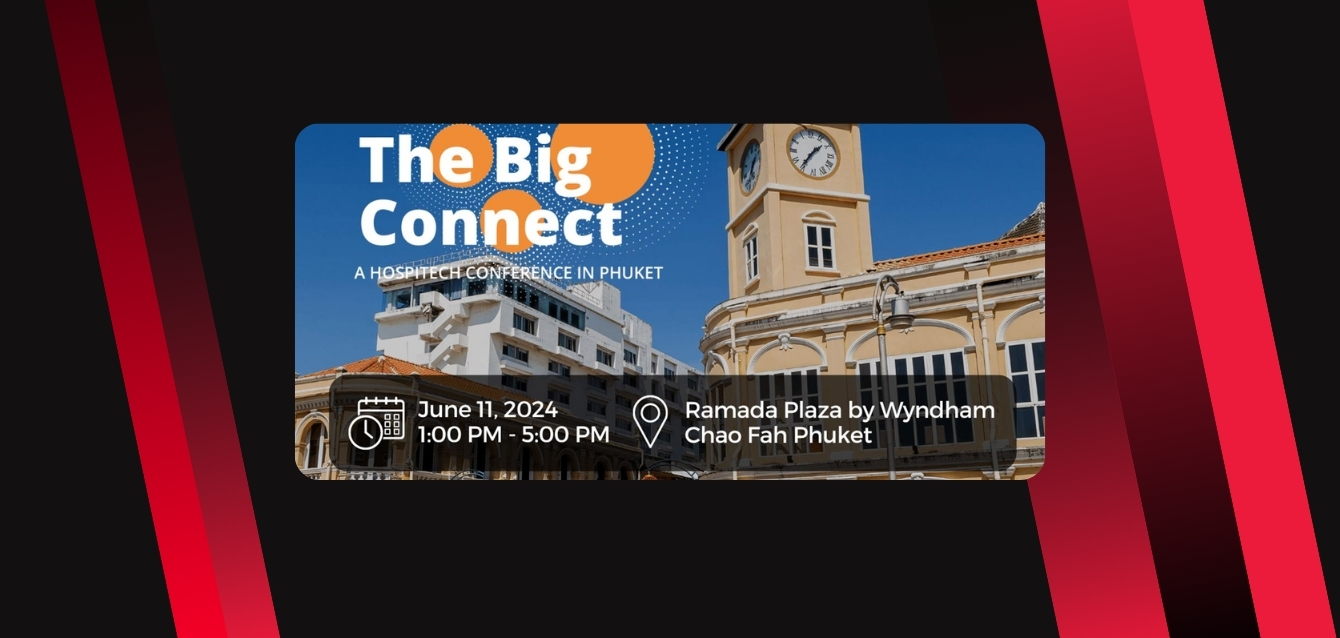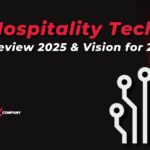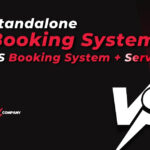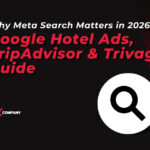The Percentage Company was delighted to have been invited to join “The BIG Connect Hospitech Conference Event in Phuket” in June 2024 by STAAH, Red Dot Payment, Soraso & MG Group. As always with these types of events, time is limited, so I thought it might be good to write longer form answers to the questions I was asked, for your reading pleasure. Without further adieu, here were the questions and answers:
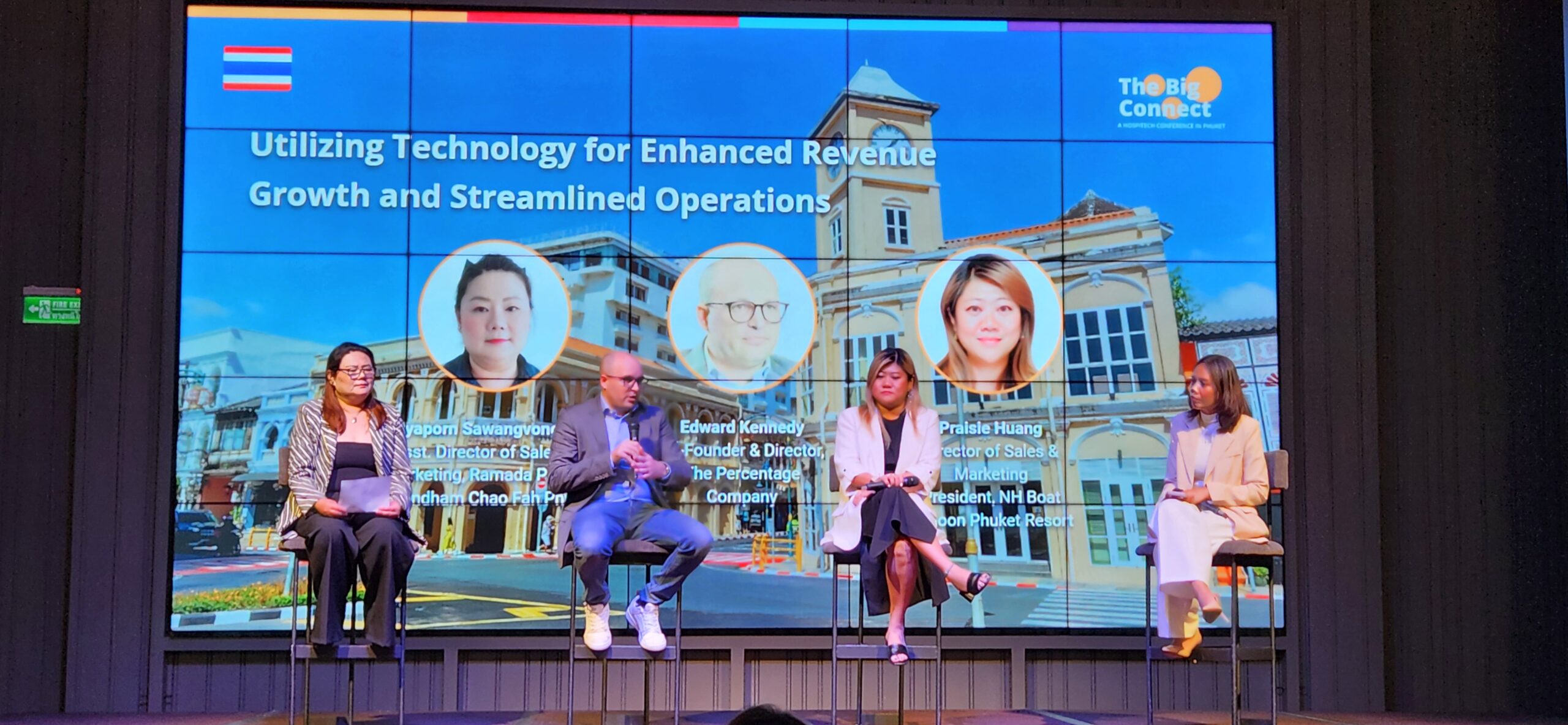
Question 1: WHAT EMERGING TECHNOLOGIES DO YOU SEE AS HAVING THE MOST POTENTIAL TO IMPACT THE HOTEL INDUSTRY IN THE NEAR FUTURE?
1. The Paradigm Shift: Artificial Intelligence in Hospitality
Artificial Intelligence (AI) is set to revolutionize the hotel industry, heralding a new era of efficiency and personalized guest experiences. The ability of AI to learn patterns, make predictions, and perform complex tasks marks a significant shift in how hotels operate and interact with their guests.
2. AI’s Potential in Streamlining Operations
One of the most immediate benefits AI offers is the automation of routine operations. By analyzing vast amounts of data, AI can optimize various processes, such as check-ins, room allocations, and housekeeping schedules. This automation not only enhances operational efficiency but also significantly reduces costs, freeing up staff to focus on more personalized guest interactions.
3. Predicting and Meeting Guest Needs
AI’s ability to predict guest needs is another game-changer. By analyzing data from previous stays, social media, and other sources, AI can anticipate what guests might need even before they articulate their desires. This could range from dietary preferences to preferred room temperatures, enabling hotels to offer a highly personalized experience. Imagine arriving at a hotel where your favorite drink is already waiting for you or your room is set to your preferred lighting and temperature settings—these are the possibilities AI brings.
4. Personalizing Guest Experiences
Beyond predictions, AI can help in tailoring each guest’s stay. Personalized recommendations for local attractions, dining options, and even in-room entertainment can be provided based on the guest’s history and preferences. This level of customization can significantly enhance guest satisfaction and loyalty.
5. Data-Driven Decision Making
AI also empowers general managers and revenue managers with data-driven insights. By analyzing trends and patterns, AI can provide actionable recommendations for pricing strategies, inventory management, and marketing campaigns. This leads to more informed decision-making, ultimately driving higher revenue and better resource allocation.
6. Challenges to Overcome
However, the integration of AI into the hotel industry is not without challenges. Key concerns include:
- Privacy and Data Security: Protecting guest data is paramount. Hotels must ensure robust data security measures to prevent breaches.
- Ethical Considerations and Job Market Changes: The rise of AI may lead to job displacement, raising ethical questions about the future of the workforce.
- Compatibility with Legacy Systems: Many hotels still operate on outdated systems that may not easily integrate with new AI technologies.
- Access to Quality Data: Successful AI implementation relies on having access to high-quality data, which can be a challenge in itself.
7. Strategic Recommendations
To navigate these challenges and fully harness the power of AI, I recommend the following strategies:
- Future-Proof Systems: Invest in modern Property Management Systems (PMS) that are designed to integrate seamlessly with AI technologies. This will ensure that your operations remain scalable and adaptable to future advancements.
- Data Collection: Start collecting and organizing guest data now. The more data you have, the more effective your AI applications will be in delivering personalized experiences and operational efficiencies.
- Continuous Learning: Stay informed about the latest developments in AI and related technologies. This will help you make informed decisions about which innovations to adopt and how to implement them effectively.
Question 2: IN WHAT WAYS CAN TECHNOLOGY BE LEVERAGED TO CREATE PERSONALIZED AND MEMORABLE EXPERIENCES FOR HOTEL GUESTS?
1. The Rise of Personalization in Hospitality
In the rapidly evolving landscape of hospitality, personalization is emerging as a crucial differentiator. Creating personalized experiences for hotel guests hinges on obtaining deep insights and amassing substantial data about their preferences and behaviors. However, the hospitality industry has historically been slow to adopt new technologies, resulting in a highly fragmented technology ecosystem.
2. The Need for Centralized Guest Data
To achieve meaningful personalization, it is essential to collect and centralize guest data. This consolidation enables hotels to automate the creation of personalized experiences at scale, ensuring interactions resonate deeply with each guest. Many hotel chains are now moving towards implementing Customer Data Portals (CDPs) to facilitate this process. These platforms are designed to integrate with Artificial Intelligence (AI) tools, further enhancing the ability to deliver personalized services.
3. Steps to Implement Personalization
3.1 Collect Guest Preference Data (with Consent)
Gathering data on guest preferences is the first step towards personalization. This includes preferences related to room amenities, dining choices, leisure activities, and more. Ensuring guests provide this information willingly and transparently is critical for maintaining trust and compliance with privacy regulations.
3.2 Eliminate Data Silos and Centralize Data
Fragmented data stored in disparate systems hampers the ability to create cohesive guest profiles. Unifying and centralizing data into a single platform allows for a more comprehensive understanding of each guest’s preferences and behavior patterns.
3.3 Identify Points of Personalization
With a centralized data system, identify key touchpoints where personalization can enhance the guest experience. These touchpoints range from pre-arrival communications to post-stay engagement.
3.4 Implement Omni-Channel Activation and Communication Strategies
Utilize various communication channels to interact with guests, ensuring a seamless experience across email, mobile apps, in-room devices, and face-to-face interactions. Consistency in messaging and personalization across all these channels is crucial.
4. Examples of Personalization in Action
- Pre-Arrival Emails: Send personalized emails before the guest’s arrival, offering tailored recommendations for their stay, such as dining options, local attractions, and special events.
- Welcome Amenities on Arrival and Check-In: Greet guests with personalized welcome amenities based on their preferences. This could include a favorite drink, preferred snacks, or even customized room settings.
- Targeted Upselling: Use guest data to offer targeted upsell opportunities, such as room upgrades, spa services, or early check-in options that align with their interests.
- Personalized In-Room Experience: Adjust in-room settings like temperature, lighting, and entertainment options according to the guest’s preferences. Smart room technology can remember these settings for repeat visits.
- Memorable In-Stay Touches: Organize unique experiences tailored to the guest’s interests, such as private tours, customized excursions, or special event tickets.
- Post-Stay Engagement: Maintain engagement with guests after their stay through personalized communications that encourage loyalty and repeat visits. Offer tailored rewards and loyalty programs that reflect their preferences and past behavior.
5. Moving Forward: Building a CDP and AI Tool
Our current focus is on developing a comprehensive CDP and integrating AI tools to enhance our personalization capabilities. This strategic investment aims to streamline data collection, analysis, and implementation, ensuring we can offer truly personalized experiences that set us apart from the competition.
Question 3: HOW CAN HOTELS STAY AGILE AND ADAPTABLE TO INTEGRATE NEW TECHNOLOGIES AS THEY CONTINUE TO EVOLVE?
1. Embracing the Fast Pace of Technological Advancement
In today’s fast-paced world, technology is evolving at an unprecedented rate. For hotels to remain competitive and relevant, it is crucial to stay open to adopting new technologies. Failure to do so can result in being left behind as competitors leverage innovative solutions to enhance guest experiences and operational efficiency.
2. Fostering a Culture of Innovation
The foundation of staying agile begins at the top. Leadership must foster a culture of innovation and forward-thinking within the organization. This involves not only being receptive to new ideas but also actively encouraging and rewarding innovation. Identifying and empowering team members who are passionate about technology and change can drive this culture forward. These “innovation champions” can lead the way in exploring and implementing new technologies.
3. Assessing Needs and Exploring New Tools
Given the constant influx of new tools and technologies, it is essential for hotels to regularly assess their needs and explore solutions that align with their strategic goals. This involves:
- Regular Technology Audits: Conduct regular assessments to identify areas where current technology may be lacking or could be improved. This helps in understanding the specific needs of the hotel and identifying potential areas for technological enhancement.
- Staying Informed About New Tools: With new tools emerging daily, it is important to stay informed about the latest advancements in hotel technology. This can be achieved by attending industry conferences, participating in webinars, subscribing to relevant publications, and engaging with technology vendors.
4. Training and Incentivizing Team Members
Technology is only as effective as the people who use it. Therefore, training staff to effectively utilize new technologies is paramount. This can be achieved through:
- Ongoing Training Programs: Implement continuous training programs to ensure staff are proficient in the latest technologies. This not only improves efficiency but also boosts employee confidence and engagement.
- Incentivizing Learning and Innovation: Encourage staff to stay up-to-date with technological advancements by offering incentives for those who complete training programs or come up with innovative ideas for utilizing new technologies.
5. Maintaining an Agile Mindset
Staying agile is fundamentally a mindset. It involves a commitment to continuous improvement and being proactive rather than reactive. To cultivate this mindset:
- Dedicate Time for Learning: Allocate specific time for staff to learn about new technologies and industry trends. This could be through regular workshops, dedicated learning days, or access to online learning resources.
- Assign Technology Monitors: Designate team members to keep abreast of technological developments. These individuals can act as liaisons between the hotel and technology vendors, ensuring the organization is always aware of new opportunities.
Question 4: HOW HAS DIGITAL MARKETING TECHNOLOGY PLAYED A ROLE IN ATTRACTING & RETAINING GUESTS, CONTRIBUTING TO REVENUE GROWTH?
A Revolution in Marketing
With over 25 years of experience in digital marketing, I’ve witnessed firsthand how this technology has revolutionized entire industries, including hospitality. When I first arrived in Phuket in 2007, digital marketing was not the powerhouse it is today. Back then, hotels relied heavily on traditional marketing methods, which often lacked precision and reach. Fast forward to the present, and it’s clear that no hotel can thrive without a robust digital marketing strategy.
Digital Marketing Strategy
1. Attracting Guests: Expanding Reach and Precision
Digital marketing has transformed the way hotels attract guests by leveraging global reach and precise targeting across multiple channels. Here’s how it works:
- Global Reach and Multi-Channel Targeting: Digital platforms allow hotels to reach a global audience through various channels such as search engines, social media, and email marketing. This global reach is critical for attracting international travelers who might not be accessible through traditional marketing means.
- Highly Targeted and Personalized Advertising: Unlike the outdated “spray and pray” approach, digital marketing enables hotels to create highly targeted and personalized ads. By utilizing data analytics, hotels can understand their potential guests’ preferences and behaviors, ensuring that marketing efforts are directed towards individuals who are most likely to convert.
- Cost-Effective Campaigns: Digital marketing often provides a more cost-effective solution compared to traditional advertising. Pay-per-click (PPC) campaigns, social media ads, and influencer partnerships allow hotels to maximize their marketing budgets by only paying for actual engagement or conversions.
2. Retaining Guests: Building Relationships and Loyalty
Beyond attracting new guests, digital marketing plays a crucial role in retaining existing ones by fostering ongoing relationships and enhancing guest loyalty:
- Building Relationships through Digital Communication: Digital marketing tools enable hotels to maintain continuous communication with their guests. Newsletters, personalized emails, and social media interactions help keep the hotel top-of-mind for past guests, encouraging repeat visits.
- Personalized Offerings and Engagement: By analyzing guest data, hotels can create personalized offers tailored to individual preferences. This could include special discounts, exclusive packages, or personalized recommendations for future stays, all of which contribute to a more personalized and engaging guest experience.
- Fostering Loyalty and Reducing Acquisition Costs: Engaging with guests through personalized digital marketing efforts helps build strong relationships and loyalty. Loyal guests are more likely to return and recommend the hotel to others, reducing the overall guest acquisition cost and increasing the lifetime value of each guest.
3. Driving Revenue Growth: Enhancing Online Presence and Control
A strong digital marketing strategy directly contributes to revenue growth by enhancing the hotel’s online presence and providing more control over the guest journey:
- Growing Revenue Through Online Presence: A well-optimized online presence allows hotels to capture more direct bookings, reducing reliance on Online Travel Agencies (OTAs) and their associated fees. Direct bookings are typically more profitable as they incur lower acquisition costs.
- Ownership and Control Over the Guest Journey: By managing their own digital marketing efforts, hotels gain more control over the entire guest journey—from the initial search to the booking process and post-stay engagement. This control enables hotels to ensure a seamless and consistent brand experience, which can lead to higher satisfaction and repeat business.
- Increasing Guest Loyalty: Digital marketing efforts that focus on personalized communication and engagement can significantly enhance guest loyalty. Loyal guests not only return for future stays but also act as brand advocates, bringing in new customers through word-of-mouth referrals.
- Monitoring Effectiveness and Optimizing ROI: One of the key advantages of digital marketing is the ability to monitor the effectiveness of campaigns in real-time. Hotels can track metrics such as click-through rates, conversion rates, and overall return on investment (ROI). This data allows hotels to continually optimize their marketing strategies, ensuring resources are allocated efficiently and effectively.
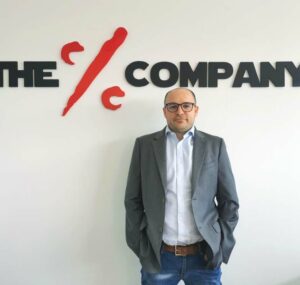
Written By: Edward Kennedy
Co-Founder & Director at The Percentage Company. I started working on websites in 1997 and have been a full-time techie since 2001. I’m committed to leveraging the latest technologies and digital marketing techniques to drive efficiency & improve online sales for our hotel clients. I have a 20+ year track record of success in growing independent hospitality & real estate brands.


